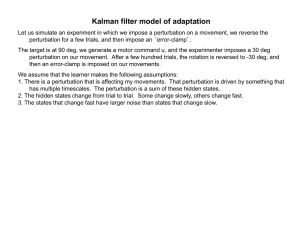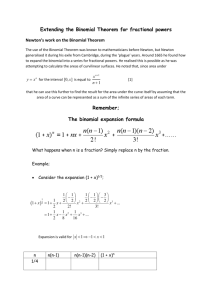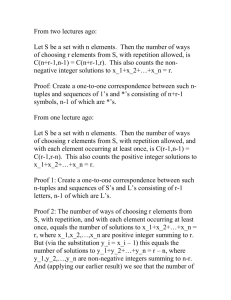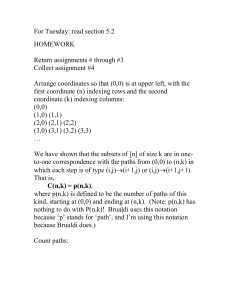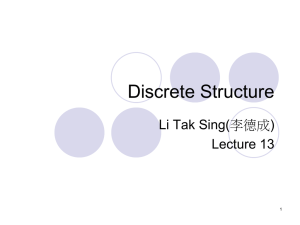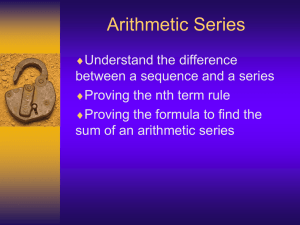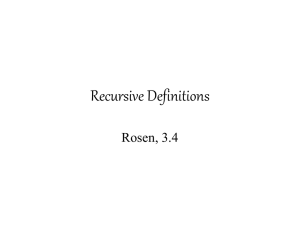For Thursday: read sections 5.3 and 5.5 and 5.6 (skip 5.4 and 5.7)
advertisement
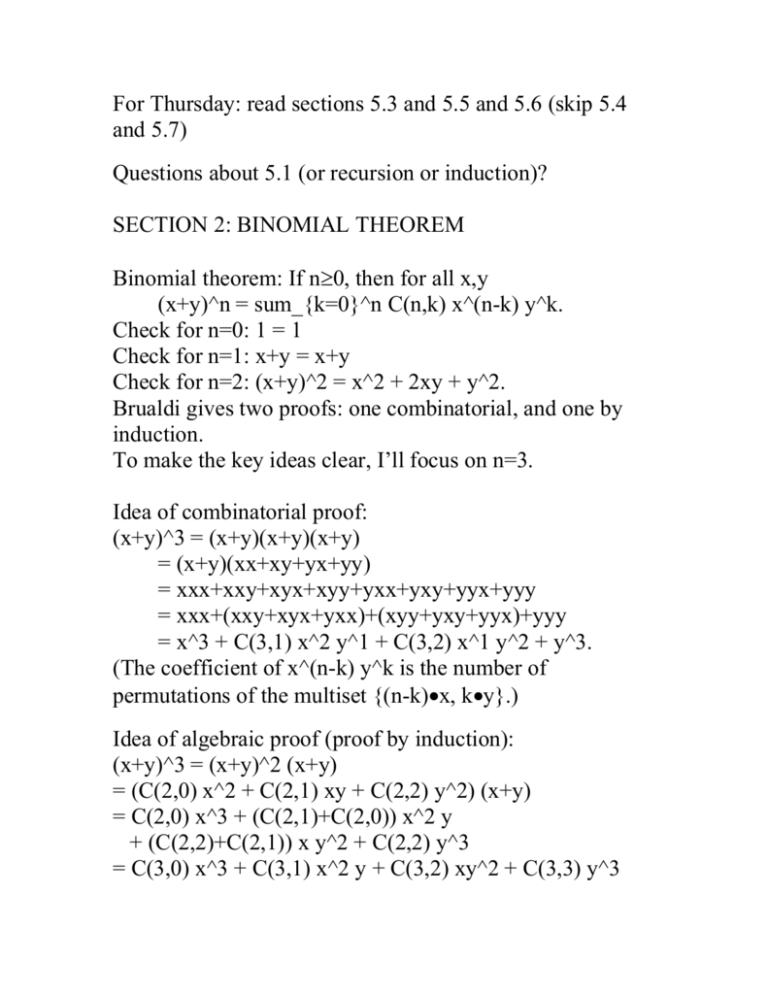
For Thursday: read sections 5.3 and 5.5 and 5.6 (skip 5.4
and 5.7)
Questions about 5.1 (or recursion or induction)?
SECTION 2: BINOMIAL THEOREM
Binomial theorem: If n0, then for all x,y
(x+y)^n = sum_{k=0}^n C(n,k) x^(n-k) y^k.
Check for n=0: 1 = 1
Check for n=1: x+y = x+y
Check for n=2: (x+y)^2 = x^2 + 2xy + y^2.
Brualdi gives two proofs: one combinatorial, and one by
induction.
To make the key ideas clear, I’ll focus on n=3.
Idea of combinatorial proof:
(x+y)^3 = (x+y)(x+y)(x+y)
= (x+y)(xx+xy+yx+yy)
= xxx+xxy+xyx+xyy+yxx+yxy+yyx+yyy
= xxx+(xxy+xyx+yxx)+(xyy+yxy+yyx)+yyy
= x^3 + C(3,1) x^2 y^1 + C(3,2) x^1 y^2 + y^3.
(The coefficient of x^(n-k) y^k is the number of
permutations of the multiset {(n-k)x, ky}.)
Idea of algebraic proof (proof by induction):
(x+y)^3 = (x+y)^2 (x+y)
= (C(2,0) x^2 + C(2,1) xy + C(2,2) y^2) (x+y)
= C(2,0) x^3 + (C(2,1)+C(2,0)) x^2 y
+ (C(2,2)+C(2,1)) x y^2 + C(2,2) y^3
= C(3,0) x^3 + C(3,1) x^2 y + C(3,2) xy^2 + C(3,3) y^3
Questions about 5.2?
SECTION 3: BINOMIAL COEFFICIENT IDENTITIES
Another example of proof by induction:
Theorem: C(n,0)+C(n,1)+C(n,2)+…+C(n,n) = 2^n.
Proof: It’s true for n=0. Assume it’s true for n-1; then
C(n,0)+C(n,1)+C(n,2)+…+C(n,n)
=(C(n-1,-1)+C(n-1,0))+(C(n-1,0)+C(n-1,1))
+(C(n-1,1)+C(n-1,2))+…+(C(n-1,n-1)+C(n-1,n))
=0+2C(n-1,0)+2C(n-1,1)+…+2C(n-1,n-1)+0
=2(C(n-1,0)+C(n-1,1)+…+C(n-1,n-1))
=2(2^(n-1))
=2^n, as claimed.
Hence by induction the formula holds for all n.
There are other ways to prove this. One is a combinatorial
proof that interprets the LHS and RHS as two different
ways of counting the same thing, namely, all the subsets of
an n-element set. The RHS counts all of these subsets at
once; the LHS counts them according to how many
elements they have. So this proof hinges on the Addition
Principle.
Here’s another proof: Set x=y=1 in the binomial theorem.
(Brualdi, p. 129)
C(n,0)-C(n,1)+C(n,2)+…C(n,n) = 0 (if n1)
Check: 1-4+6-4+1=0
Check: 1-5+10-10+5-1=0
If n is odd, you can cancel terms two at a time; if n is odd,
it’s not so easy to prove that the alternating sum is 0.
Proof by induction: Left to you to fill in the details.
Combinatorial proof: We can write the alternating sum
sum_k C(n,k) (-1)^k
as
sum_{S} (-1)^|S|,
where S ranges over all the subsets of [n].
(Check: If we gather together all the S’s for which
|S|=k, we get C(n,k) terms equal to (-1)^k.)
Pair up the subsets of [n], as shown below for n=3:
{} pairs with {3}
{1} pairs with {1,3}
{2} pairs with {2,3}
{3} pairs with {1,2,3}
Note that each S that contributes +1 to the sum gets paired
with an S that contributes –1 to the sum, and vice versa.
Hence the total is zero.
Here’s another proof: Set x=1, y=-1 in the binomial
theorem.

